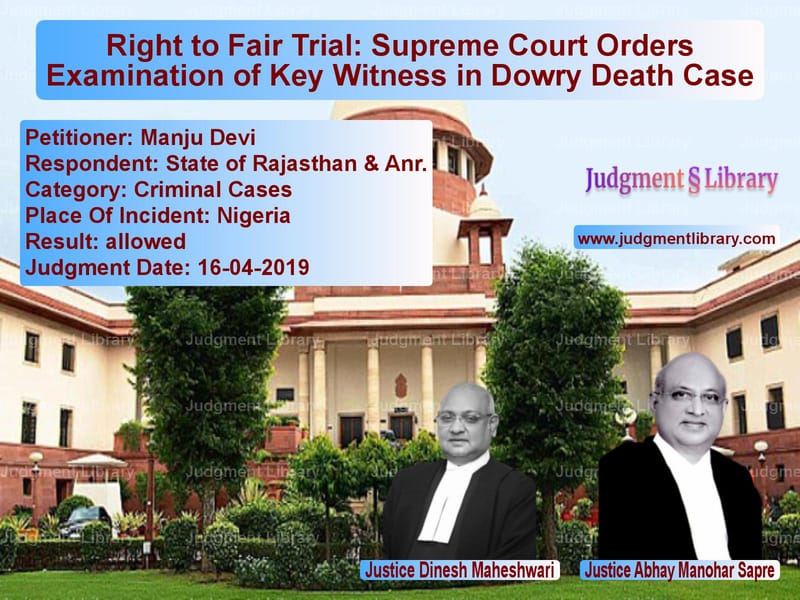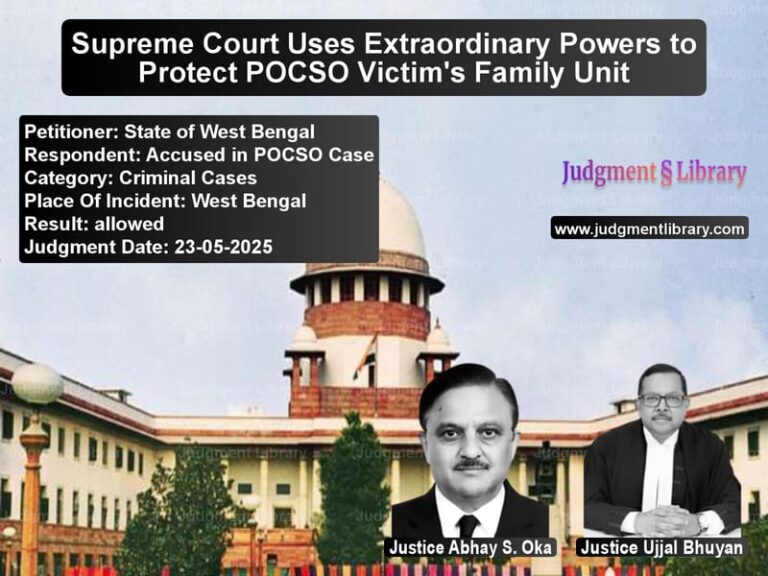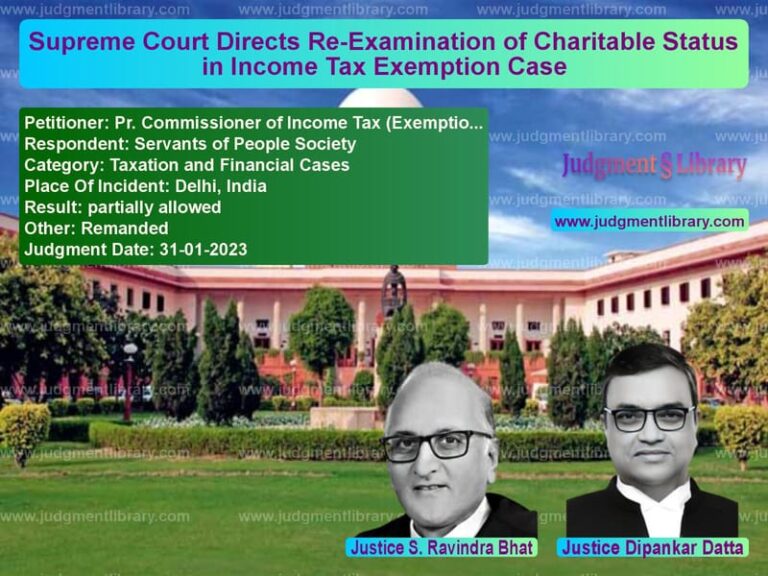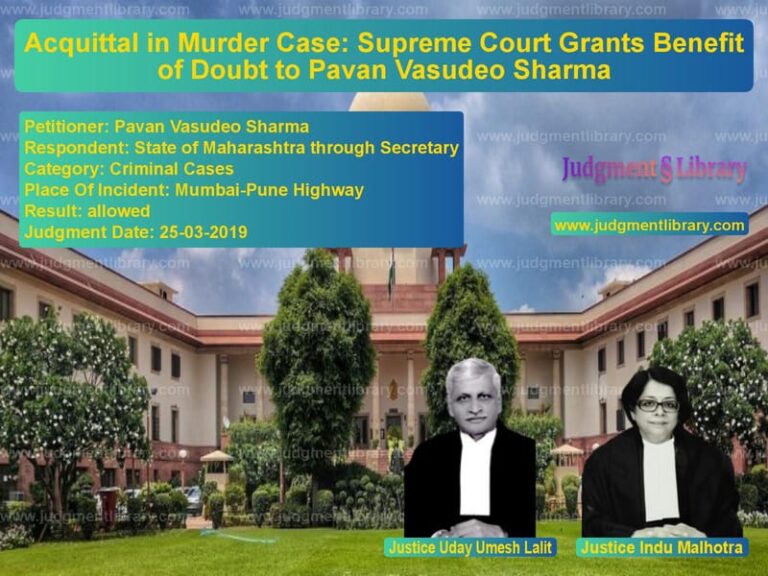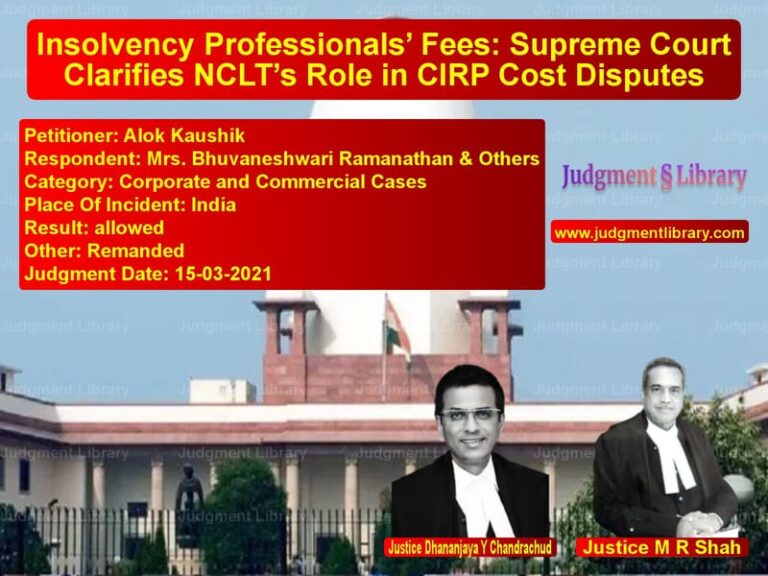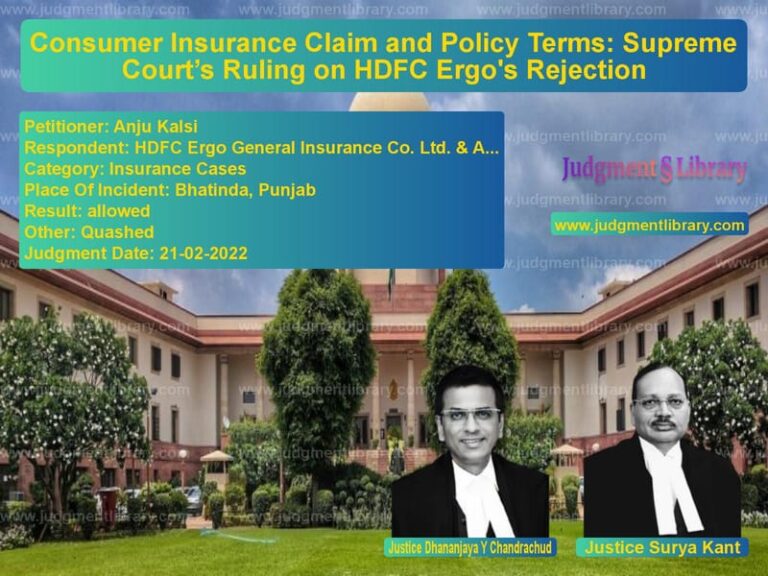Right to Fair Trial: Supreme Court Orders Examination of Key Witness in Dowry Death Case
In a crucial judgment, the Supreme Court of India addressed the right to fair trial and the necessity of witness examination in a criminal case involving allegations of dowry harassment and unnatural death. The case of Manju Devi vs. State of Rajasthan & Anr. revolved around the denial of summoning a key medical witness whose testimony was vital in determining the cause of the victim’s death.
The appellant, Manju Devi, mother of the deceased, challenged the decision of the trial court and the Rajasthan High Court, both of which had refused to summon Dr. I. Yusuf, a medical professional from Nigeria who had conducted the first post-mortem examination of her daughter. The Supreme Court, in its ruling, emphasized the importance of material witness testimony and ordered the lower court to ensure that the doctor’s evidence is recorded, even if through video conferencing.
Case Background
The deceased, daughter of the appellant, was married to the accused-respondent on April 21, 2008. After marriage, she initially lived with her in-laws in Rajasthan before shifting to Bangalore and later to Nigeria with her husband. The prosecution alleged that she was regularly harassed for dowry, which eventually led to her unnatural death.
On January 14, 2010, the appellant’s daughter was found hanging from the ceiling fan in her room in Nigeria. The father of the deceased lodged an FIR in Rajasthan, alleging that his daughter had been subjected to dowry-related harassment and cruelty, leading to her death.
Key Events Leading to the Trial
- The first post-mortem was conducted in Nigeria on January 16, 2010, by Dr. I. Yusuf, who reported that the cause of death was “asphyxia secondary to strangulation.”
- The body was then brought to India, and a second post-mortem was conducted by a medical board. However, this report could not determine a definite cause of death.
- A charge-sheet was filed against the husband under Sections 302, 304-B, and 498-A of the Indian Penal Code (IPC).
- During the trial, the appellant moved an application under Section 311 of the Code of Criminal Procedure (CrPC) to summon Dr. Yusuf for testimony.
- The trial court rejected the application, citing the prolonged duration of the trial (eight years) and stating that a copy of Dr. Yusuf’s post-mortem report was already on record.
- The Rajasthan High Court upheld the trial court’s decision, dismissing the petition on August 2, 2018.
- The appellant then approached the Supreme Court.
Arguments by the Petitioner (Manju Devi)
The petitioner, mother of the deceased, argued that:
- Dr. Yusuf’s testimony was critical as he was the first medical professional to examine the body.
- The trial court failed to appreciate that the second post-mortem report in India was inconclusive, making Dr. Yusuf’s findings even more important.
- The rejection of her application was based solely on procedural delays rather than the merits of the case.
- The right to a fair trial mandates that all material witnesses be examined to arrive at a just conclusion.
- If physical summoning of the doctor was difficult, his testimony could be recorded via video conferencing.
Arguments by the Respondent (Accused Husband)
The accused opposed the appeal, stating that:
- The prosecution had already submitted the Nigerian post-mortem report as evidence.
- Summoning Dr. Yusuf would only cause unnecessary delay in an already prolonged trial.
- The trial court had exercised its discretion correctly in rejecting the petition, and the High Court had rightly refused to interfere.
- The appeal was a deliberate attempt to protract the proceedings.
Supreme Court’s Observations and Verdict
The Supreme Court, after considering the submissions, ruled in favor of the appellant and allowed the appeal. The Court highlighted several key legal principles:
“It needs hardly any emphasis that the discretionary powers like those under Section 311 CrPC are essentially intended to ensure that every necessary and appropriate measure is taken by the Court to keep the record straight and to clear any ambiguity in so far as the evidence is concerned as also to ensure that no prejudice is caused to anyone.”
The Supreme Court found fault with the reasoning of the trial court and the High Court, stating that:
- The lower courts erred in dismissing the application based on the duration of the case rather than considering the necessity of the evidence.
- The testimony of Dr. Yusuf was crucial, as his findings could impact the final determination of the cause of death.
- The trial court had failed to consider alternative means of recording the witness’s testimony, such as through video conferencing.
- The right to a fair trial requires that all relevant evidence be brought on record.
In support of its ruling, the Supreme Court referred to previous judgments where the discretionary power under Section 311 CrPC had been applied to ensure justice:
“The scope and object of the provision is to enable the court to determine the truth and to render a just decision after discovering all relevant facts and obtaining proper proof of such facts.”
The Court also pointed out that Section 284 and 285 CrPC provide mechanisms for recording testimony when a witness is outside India:
“In the given set of facts and circumstances, where the witness Dr. I. Yusuf is residing in Nigeria, for the purpose of recording of his statement, the Trial Court could have unquestionably taken recourse to the provisions of Sections 284 and 285 CrPC so as to avoid the delay in the matter and inconvenience to the parties and the witness.”
Final Ruling
The Supreme Court set aside the previous orders of the trial court and the High Court. It directed that Dr. Yusuf’s testimony must be recorded, either by summoning him through the Nigerian High Commission or via video conferencing.
“The Trial Court shall now take all the necessary measures for ensuring the examination of the witness concerned by issuing commission and/or recording his statement through video conferencing and shall also ensure expeditious proceedings so as to conclude the matter at the earliest.”
Significance of the Judgment
This ruling reaffirms the fundamental principles of criminal jurisprudence:
- Every accused person is entitled to a fair trial.
- All material witnesses must be given an opportunity to present their evidence.
- Technological means such as video conferencing should be used to facilitate justice.
- Courts must prioritize substantive justice over procedural delays.
The judgment sets a crucial precedent for cases involving international witnesses and strengthens the procedural safeguards in criminal trials.
Petitioner Name: Manju Devi.Respondent Name: State of Rajasthan & Anr..Judgment By: Justice Dinesh Maheshwari, Justice Abhay Manohar Sapre.Place Of Incident: Nigeria.Judgment Date: 16-04-2019.
Don’t miss out on the full details! Download the complete judgment in PDF format below and gain valuable insights instantly!
Download Judgment: Manju Devi vs State of Rajasthan & Supreme Court of India Judgment Dated 16-04-2019.pdf
Direct Downlaod Judgment: Direct downlaod this Judgment
See all petitions in Dowry Cases
See all petitions in Murder Cases
See all petitions in Judgment by Dinesh Maheshwari
See all petitions in Judgment by Abhay Manohar Sapre
See all petitions in allowed
See all petitions in supreme court of India judgments April 2019
See all petitions in 2019 judgments
See all posts in Criminal Cases Category
See all allowed petitions in Criminal Cases Category
See all Dismissed petitions in Criminal Cases Category
See all partially allowed petitions in Criminal Cases Category

